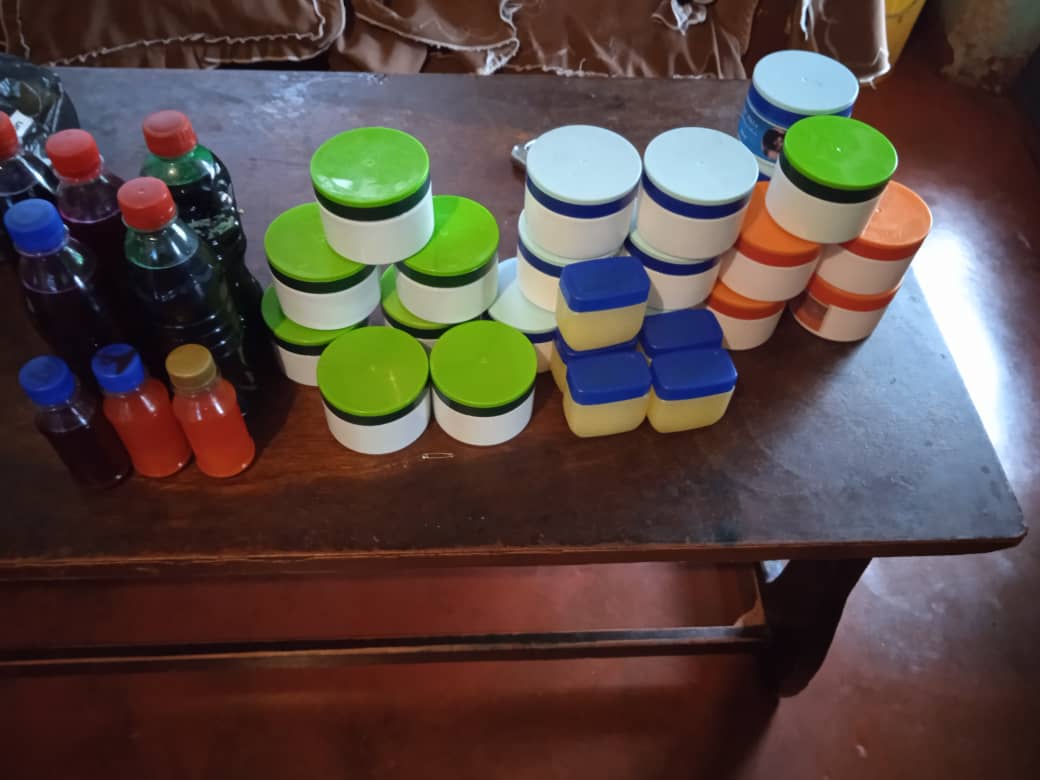|
Getting your Trinity Audio player ready...
|
By Calvin Manika
Irene Bhebhe inspects the lotions as other women pack them after sealing the finished products at a house in the high-density suburb of Chinotimba. She makes sure that standards are kept on all stages of production until distribution to the end-user. Despite the effects of Covid-19 in the resort city of Victoria Falls which brought business to a standstill, forcing others to backtrack to the ‘roots’, women like Irene managed to stay afloat.
Speaking to this publication, Irene Bhebhe who is the Executive Member of Hands Together Victoria Falls Women’s Organisation (HTVDWO) representing the Chinotimba based Thandanani women group applauds the organisation of making tangible projects which are hands-on and helping women in the Victoria Falls Community.
“So far, we have lemon garlic lotion, carrot lotion, mosquito repellant lotion, petroleum jelly, toilet cleaner, dilute-to-taste drink, dairy juice, and floor polish, and we are moving on regardless of impediments,” says Bhebhe.
Women everywhere have been faced with many challenges brought by the Covid-19 pandemic. But, in Zimbabwe, it has been coupled with the economic depression in the country.
Most of the women in the resort city are engaged in various businesses which include craft and curio artifacts, fruits and vegetables, poultry, and selling second-hand clothes. However, most of them are not coordinated and organised that they can approach a financial institution or secure funding. But with HTVDWO, it’s a different route as the organisation is closing the gap on women’s inequality and daily challenges.
In an interview with Spiked Online Media, Simomo Sibanda, the chairperson of Hands Together Victoria Falls Women’s Organisation (HTVDWO) highlighted challenges and opportunities presented by the obtaining environment.
“In poultry, most groups have challenges of price competition. Also, because feeds are expensive, they sell their products at lower prices so as to attract the impulse of the buyers thus they end up having just small amounts of profit. Mostly, their customers buy on credit, especially their members. By the end of the day, the payments are staggered leading to losses again.
“The payments done through Ecocash, Zimbabwe dollars (bond) or Zipit by the end of their sales mean a loss as the money will have lost value. The Butcher project members are facing rental escalation within a short space of time,” says Sibanda.
Speaking on the failed projects Sibanda alludes that projects like clothing markets have not done well because they are still waiting for the government approval which will mean the city authority can allocate working spaces in different wards, the same challenges faced with the bakery projects.
In a bid to help women in Victoria Falls HTVDWO is also incorporating child mothers, the women who became mothers due to various unfortunate circumstances but still in the range of children.
“We have a few coming up but most are giving up. I think it’s peer pressure. They feel lost, especially in joining practical projects like poultry. They show more interest in buying and selling stuff like second-hand clothes but their challenge becomes unavailability of cash to purchase the clothing bales, so they end up reserved. But, generally, we still keep trying although most groups are struggling to make ends meet. As of now that’s far we have gone,” says Sibanda.
With a discouraging economic environment and the high cost of living in the resort city, the daily woes of these women are becoming unbearable.
In its National Development Strategy 1 (NDS 1) launched on 16 November 2020 by the government of Zimbabwe and expected to run from January 2021 – December 2025, the issue of women and gender mainstreaming is highlighted as a priority.
The government acknowledges that the current situation is largely characterised by pronounced youth exclusion and limited gender mainstreaming.
“Women still face hurdles in respect of opportunities to ascend to commanding heights in the national economy, including; limited access to finance; limited access to land and freehold property; limited opportunities to influence policy; and legal, cultural and patriarchal barriers,” noted the national guidelines.
Challenges facing women in Victoria Falls are attested to the government’s pledge to prioritise gender equality in order to enhance women’s participation in the development process, in line with the Constitution, the SADC Protocol on Gender and Development, the Protocol to the African Charter on Human and People’s Rights on the Rights of Women in Africa, United Nations’ Sustainable Development Goal 5, which seeks to “Achieve Gender Equality and Empower all Women and Girls.
The HTVDWO vision seems to be promising as their work falls in the category of emerging community organisations that the IAA project seeks to engage. The IAA project is run through a partnership between Youth 2Youth in Zimbabwe and Zimbabwe Women in Tourism, and AGS which is an international organisation.
Speaking to this publication, the founder and Director of Youth to Youth in Zimbabwe, Catherine Masunda, said the partnership with AGS will go a long way to achieve their goals as Youth2Youth in Zimbabwe and Women in Tourism thrive on a good working relationship with different organizations throughout the country and the global community.
“Our aim is to ensure that the women are able to supply products and services of high quality and globally competitive standards. We endeavour to establish and implement a practical and effective regional monitoring and evaluation system to track progress and report on development status,” says Masunda.






